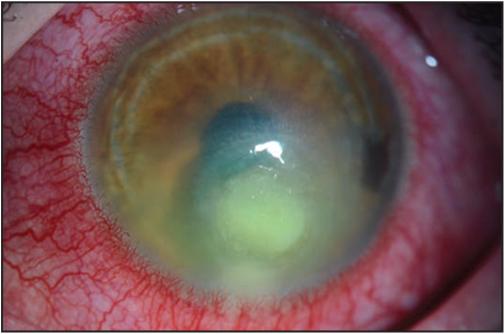
Credit: CDC (Deborah S. Jacobs, Jia Yin)
WASHINGTON, DC — Contact lenses are worn by an estimated 45 million Americans. Improper care or wear, like going to sleep without removing your lenses, can lead to infections of the cornea like microbial keratitis, which can lead to serious health problems.
Six tales that should serve as warnings are the latest in a series on infections featured in the January issue of Annals of Emergency Medicine and developed through a partnership between the Centers for Disease Control and Prevention (CDC) and the EMERGEncy ID Net, an emergency department-based collaborative surveillance network. The CDC reports that an estimated 1 million annual outpatient and emergency visits were due to keratitis.
“Sleeping in your contact lenses is risky and can lead to infections, or in some cases, permanent damage,” said Jon Femling, MD, PhD, Assistant Professor, Department of Emergency Medicine, University of New Mexico School of Medicine and lead author. “Falling asleep, or even napping, without removing your contact lenses can significantly increase the likelihood of serious health problems.”
The Annals of Emergency Medicine commentary is based on a CDC Morbidity and Mortality Weekly Report titled, Corneal Infections Associated with Sleeping in Contact Lenses – Six Cases, United States, 2016-2018. The original authors are Jennifer R. Cope, MD, Nuadum Muriel Konne, MPH, Deborah S. Jacobs, MD, Deepinder K. Dhaliwal, MD, Michelle K. Rhee, MD, Jia Yin, MD, PhD, Thomas L. Steinemann, MD.
In one case, a man evaluated for eye redness and blurry vision reported sleeping in contact lenses 3-4 nights per week and swimming with them. He was treated for bacterial and fungal microbial keratitis.
Another instance outlines an adolescent girl who slept in lenses purchased without a prescription at a chain drug store. She developed a corneal ulcer that resulted in scarring.
A man who wore the same lenses for two weeks was diagnosed with a perforated cornea, bacterial infection and ultimately required a transplant to save his right eye.
“Sleeping in lenses is one of the riskiest and most commonly reported behaviors for adolescent and adult contact lens wearers,” said Dr. Femling. “If you want to avoid infection, and avoid a trip to the emergency department, proper eye care is a must.”
###
Annals of Emergency Medicine is the peer-reviewed scientific journal for the American College of Emergency Physicians (ACEP), the national medical society representing emergency medicine. ACEP is committed to advancing emergency care through continuing education, research, and public education. Headquartered in Dallas, Texas, ACEP has 53 chapters representing each state, as well as Puerto Rico and the District of Columbia. A Government Services Chapter represents emergency physicians employed by military branches and other government agencies. For more information, visit http://www.
Media Contact
Steve Arnoff
[email protected]
202-370-9292
Original Source
http://newsroom.




